This article compares the local ecological knowledge (LEK) of quilombolas in the Atlantic Forest (Brazil) to scientific knowledge about the diet of four ungulate taxa (Tapirus terrestris L., Mazama spp., Pecari tajacu L., Tayassu pecari Link). LEK was gathered through interviews conducted with the freelisting method and through closed questionnaires. Ecological studies were compiled via a systematic review of the specialized academic literature. The research detected points of convergence and divergence between these knowledge systems. Local knowledge of the food classes in the ungulate diet indicated a wider range of items than that observed in 65 scientific studies of the foraging habits of these species. Certain characteristics of the LEK, such as its principal focus on environments that are not commonly investigated by ecological studies, form the basis of these divergences and reveal the complementary potential of LEK relative to scientific data in this field.
How to translate text using browser tools
1 December 2013
Complementary Viewpoints: Scientific and Local Knowledge of Ungulates in the Brazilian Atlantic Forest
Helbert Medeiros Prado,
Rui Sérgio Sereni Murrieta,
Cristina Adams,
Eduardo Sonnewend Brondizio
ACCESS THE FULL ARTICLE
It is not available for individual sale.
This article is only available to subscribers.
It is not available for individual sale.
It is not available for individual sale.

Journal of Ethnobiology
Vol. 33 • No. 2
Fall/Winter 2013
Vol. 33 • No. 2
Fall/Winter 2013
Atlantic forest
ethnoecology
local ecological knowledge
quilombolas
ungulates




